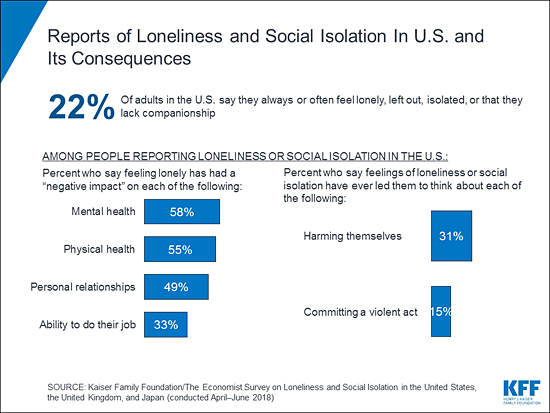KFF/Economist Survey: One in Five Americans Report Always or Often Feeling Lonely or Socially Isolated, Frequently With Physical, Mental, and Financial Consequences
One in five Americans (22%) say they always or often feel lonely or socially isolated, frequently with serious consequences, finds a new Kaiser Family Foundation/Economist three-country survey examining loneliness and social isolation.
Americans who feel lonely or socially isolated often report negative impacts on their mental (58%) and physical (55%) health, their personal relationships (49%) and ability to do their job (33%). Some also say it has led them to think about harming themselves (31%) or committing a violent act (15%).

The survey also finds that while most Americans (58%) view the increased use of technology as a major reason why people feel lonely and socially isolated, those who report feeling lonely or socially isolated are divided on the impact of social media in particular. About as many say using social media such as Facebook, Snapchat and Twitter has made their feelings of loneliness better (31%) and worse (27%).
The survey takes a comprehensive look at the prevalence, causes and consequences of loneliness and social isolation in the United States, the United Kingdom and Japan at a time when aging societies and increasing use of technology is generating concerns about the effects of loneliness on health. Findings appear in The Economist’s Sept. 1 issue and in a separate KFF report that looks at people’s views and experiences with loneliness across the three countries.
Reports of always or often feeling lonely or socially isolated are similar in the U.S. (22%) and U.K. (23%), compared to 9 percent in Japan.
Other findings include:
- Loneliness appears to be closely tied to real life problems and circumstances, with at least six in 10 of those experiencing it across the three countries citing a specific cause, most often the death of a loved one. Those who feel lonely are much more likely to report a negative change in financial status, a change in living situation, a serious injury or illness personally, or loss of a job in the past two years than those who don’t report feeling lonely across the three countries.
- In the United States, those most likely to experience loneliness include people who report having a mental health condition (47% report loneliness) or a debilitating health condition (45%). That’s roughly three times the rates for those who don’t have such conditions.
- Similarly, Americans who are single, divorced, widowed or separated are more than twice as likely to report feeling lonely or socially isolated than those who are married or living with a partner (33% compared to 13%). The pattern is similar in the U.K. and Japan.
- Half of Americans (51%) say they’ve heard “a lot” or “some” about the problems of loneliness and social isolation – fewer than say the same in the United Kingdom (67%), where a minister for loneliness was appointed earlier this year.
- Across countries, large majorities of people say individuals and families should play a major role in helping to reduce loneliness and social isolation in society today. However, just about a quarter of Americans (27%) say the government should play a major role, less than half the shares who say the same in the U.K. and Japan. Most Americans (61%) also see a major role for churches and other religious institutions.
The three-country survey is part of a polling partnership between KFF and The Economist. The poll was designed and analyzed by survey researchers at KFF in collaboration with The Economist. Each organization is solely responsible for the content it publishes based on the survey.
The poll was conducted by telephone from April through June 2018 among random digit dial telephone (landline and cell phone) samples of adults in the U.S. (1,003), the U.K. (1,002) and Japan (1,000), including at least 200 adults in each country who report always or often feeling lonely or socially isolated.
The margin of sampling error is plus or minus 3 percentage points for the U.S. results and plus or minus 4 percentage points for results for the U.K. and Japan. For results based on subgroups, the margin of sampling error may be higher.